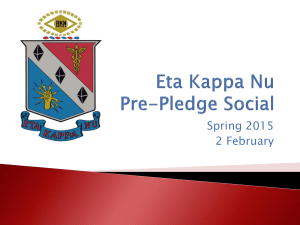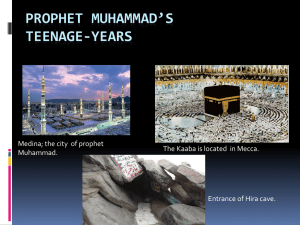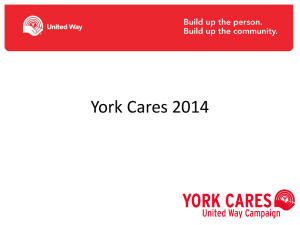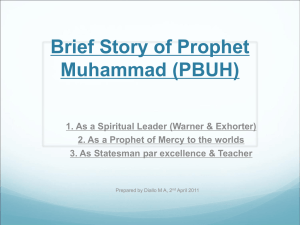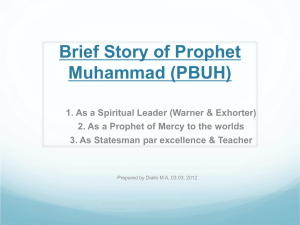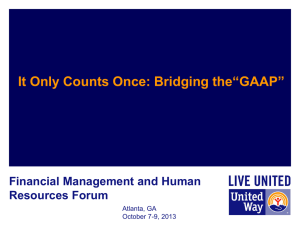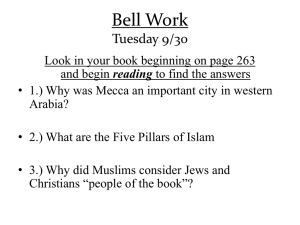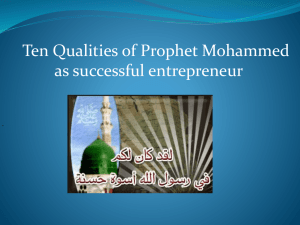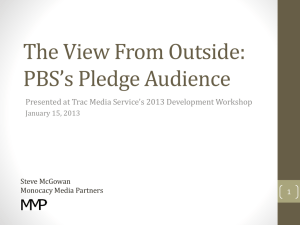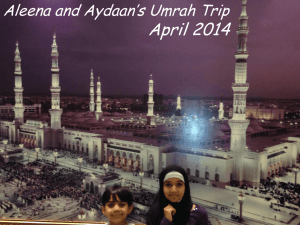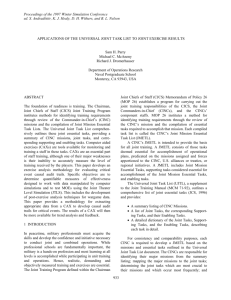Aqabah Pledge - Al Fajr | Institute of Islamic Sciences
advertisement
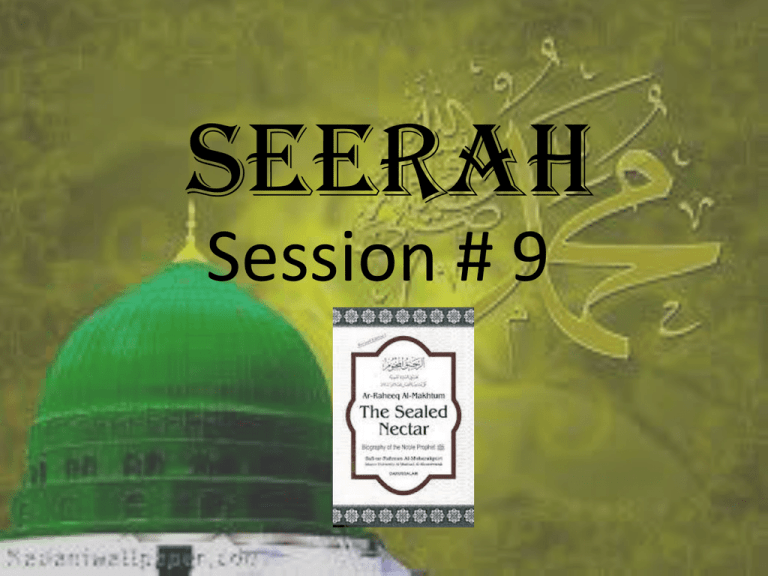
seerah Session # 9 The First Aqabah Pledge 12th year of Prophet hood • In the 12th year of prophet hood, a group of twelve people came from Madinah, ready to acknowledge Muhammad (saw) as a Prophet. • They avowed their faith in Muhammad as a Prophet and swore: – "We will not worship any one but one Allah; – we will not steal; – neither will we commit adultery, – nor kill our children; – we will not utter slander, intentionally forging falsehood – we will not disobey you in any just matter • When they had taken the pledge, Prophet said: "He who carries it out, Allâh will reward him; and who neglects anything and is afflicted in this world, it may prove redemption for him in the Hereafter; and if the sin remains hidden from the eyes of the men and no grief comes to him, then his affair is with Allâh. He may forgive him or He may not. The Muslim envoy in Madinah • After the Pledge, the Prophet sent to Yathrib (Madinah) Mus‘ab bin ‘Umair Al-‘Abdari [R], the first Muslim ‘ambassador’ to teach the people there the doctrines of Islam, give them practical guidance and make attempts at propagating Islam among those who still professed polytheism. • As‘ad bin Zurarah hosted him in Madinah. So prepared was the ground, and so zealous the propagation that Islam spread rapidly from house to house and from tribe to tribe. • Mus‘ab stayed in Madinah carrying out his mission diligently and successfully until all the houses of Al-Ansar (the future Helpers) had Muslim elements, men and women. • Shortly before the approach of the following pilgrimage season, i.e. the thirteenth year of Prophethood, Mus‘ab bin ‘Umair returned to Makkah carrying to the Prophet (pbuh) glad tidings about the new fertile soil of Islam in Madinah, and its environment rich in the prospects of good, and the power and immunity that that city was bound to provide to the cause of Islam. The Second ‘Aqabah Pledge • The next year, thirteenth of Prophethood, June 622 A.D., during the pilgrimage season, over seventy converts from Madinah came in the trail of their polytheist people to perform the rituals of pilgrimage in Makkah • The oft-repeated question amongst them was "Isn’t it high time we protect Muhammad instead of leaving him forsaken, deserted and stumbling in the hillocks of Makkah?" • Shortly after arrival, they conducted secret contacts with the Prophet and agreed to meet him secretly at night in mid Tashreeq Days (the 11th, 12th and 13th days of Dhul Hijja) in a hillock at Al-‘Aqabah, the last year’s meeting place. • One of the leaders of the Ansâr (Helpers), Ka‘b bin Malik Al-Ansari, gave an account of the historic meeting which changed the whole course of the struggle between Islam and paganism. • They waited for the Prophet until he came in the company of his uncle Al-‘Abbas bin ‘Abdul Muttalib (who was not a Muslim at that time),but was afraid of his nephew’s security, he was the first one to speak: • "O you people of the Khazraj (aws and khazraj) you all know the position that Muhammad holds among us. We have protected him from our people as much as we could. He is honoured and respected among his people. He refuses to join any party except you. So if you think you can carry out what you promise while inviting him to your town, and if you can defend him against the enemies, then assume the burden that you have taken. But if you are going to surrender him and betray him after having taken him away with you, you had better leave him now because he is respected and well defended in his own place." • One of the leaders of the Ansars(helpers) Ka’ab Bin Malik replied “we have heard your words, and now, O Messenger of Allah, it is for you to speak and take from us any pledge that you want regarding your Lord and yourself.” • It was a definite stance showing full determination, courage and deep faith to shoulder the daunting responsibility and bear its serious consequences. • The Prophet then preached the Faith, and the pledge was taken. – To listen and obey in all sets of circumstances. – To spend in plenty as well as in scarcity. – To enjoin good and forbid evil. – In Allâh’s service, you will fear the censure of none. – To defend me in case I seek your help, and debar me from anything you debar yourself, your spouses and children from. And if you observe those precepts, Paradise is in store for you. • All the men gave their pledge one by one, by holding the hand of the Prophet (pbuh). • With respect to the two women, the pledge was taken orally as the Prophet (pbuh) had never shaken hands with a strange lady. • The Prophet (pbuh) then asked the group to appoint twelve deputies to preach Islam to their people in Madinah, to shoulder the responsibility of implementing the articles of this pledge and to guide the respective men of their own tribes in matters relating to the propagation of Islam. The deputies elected were nine from Al-Khazraj. Three others were from Al-Aws. • No sooner did Quraish hear of this treaty, a kind of trouble-provoking tumult began to mushroom in all directions. They realized quite fully that an allegiance of this sort is bound to produce far-reaching ramifications of direct impact on their lives and wealth. • The following day, they addressed the Madinese: "O people of Khazraj, it transpired to us that you have come here to conclude a treaty with this man (Muhammad) and evacuate him out of Makkah. By Allâh, we do really hold in abhorrence any sort of fight between you and us." • The Madinese polytheists having known nothing about the secretly taken pledge, began to swear by Allâh and answered in good faith that there was no truth in the report. • ‘Abdullah bin Ubai, a Madinese polytheist, refuted their allegations denouncing them as null and void, claiming that his people would never initiate anything unless he gave them clear orders. • The Madinese Muslims, however, remained silent neither negating nor confirming. The Quraishite leaders seemed to be almost convinced by the arguments presented by the polytheists, and went back home frustrated. • That is the story of the Second ‘Aqabah Pledge, later known as the Great ‘Aqabah Pledge, effected in an atmosphere of love, allegiance and mutual support between Madinese believers and weak Makkan Muslims. The Vanguard of Migration (in the Cause of Allâh) • After the endorsement of the Second ‘Aqabah Pledge and the establishment of a small Muslim state in a vast desert surging with disbelief and ignorance — the most serious gain in terms of Islam — the Prophet gave his leave for the Muslims to migrate to Madinah, the emerging Muslim state. • Muslims began to migrate, while the polytheists spared no effort in hindering and debarring them, knowing beforehand that such a move implied unimaginable threats and unthinkable destructive dangers to their whole society. An-Nadwah (Council) House The Parliament of Quraish • The polytheists were paralyzed by the carefully planned and speedy movement of Muhammad’s followers towards their new abode in Madinah. They were caught in unprecedented anxiety and got deeply worried over their whole pagan and economic entity. • They, therefore, began to seek the most effective method that could avert this imminent danger. They convened a meeting, two and a half months after the Great ‘Aqabah Pledge. On that day, “The Parliament of Makkah" held the most serious meeting ever, with one item on the agenda: How to stop that tidal wave of immigration of new muslims. Delegates representing all the Quraishite tribes attended the meeting. • On their way to An-Nadwah House, Iblis (Satan) in the guise of a venerable elderly man standing at the door interrupted their talk and introduced himself as a man from Najd curious enough to attend the meeting, listen to the debate and wish them success to reach a sound opinion. He was readily admitted in. • There was a lengthy debate and several proposals were put forward. • Expulsion, Imprisonment for life and assassination all possibilities were discussed and rejected. • The difficulty was at last solved by Abu Jahl himself, who suggested that a band of young men, one from each tribe, should strike Muhammad simultaneously with their swords so that the blood-money would be spread over them all and therefore could not be exacted, and his people would seek a mind-based recourse for settlement. • The sinful proposal was unanimously accepted, and the representatives broke up the meeting and went back home with full determination for immediate implementation.

